MIT SCHOOL OF HUMANITIES, ARTS, AND SOCIAL SCIENCES
Media + Awards Digest | January 2022

The Media + Awards Digest is a section of the Said and Done newsletter. Subscribe
Media Digest Section | Awards Section
MEDIA DIGEST
DEMOCRACY MATTERS

MIT SHASS
Strengthening Democracy: A Sampler of MIT Research and Commentary
Browse a distilled collection of key MIT research and media contributions over the past year on the state of U.S. democracy. What does the country need to do to sustain democracy?
Browse the webpage
ELECTION LAB BLOG
Protecting the linchpin: America's election officials | David Levine
Expert, dedicated election officials are the linchpin for ensuring the integrity of US elections. Levine, an Elections Integrity Fellow at the Alliance for Securing Democracy, writes that although the 2020 presidential election was the most secure in US history, election officials are being threatened and harassed. He recommends ten ways state/local governments can protect and retain America's invaluable election officials.
Commentary
POLITICO
Covid fast-forwards the future of voting | Election Lab research cited
The impact of Covid on U.S. voting was profound: In 2020, a record high 46 percent of Americans cast a mail ballot, up from just 21 percent in 2016. Those numbers, combined with the 26 percent of voters who cast a ballot early in-person (also a record), made the 2020 election the first time in modern presidential election history that a majority of Americans did not vote in person on Election Day.
Story at Politico
WAR ON THE ROCKS
Americans' changing views on the military | Robert Ralston, Ronald R. Krebs
Ralston and Krebs found that, across the political spectrum, Americans express more deference to the military today than in the past and that their views are now more influenced by political beliefs. They also found that "a majority of Americans no longer "affirm the principle of civilian supremacy over the military." Ralston is a postdoctoral Grand Strategy, Security, and Statecraft Fellow in the MIT SHASS Security Studies Program.
Story at War on the Rocks | Robert Ralston
THE NEW YORK TIMES
Inflation alters the political terrain for right-wing populists | Daron Acemoglu quoted
Ahead of elections, right-wing authoritarian leaders are grappling with problems posed by the global rise in prices. MIT economist Acemoglu said that until recently, the low interest rates that began with "the global financial recession...made many countries that had either weak democracies or semi-authoritarianism, or sometimes fully fledged authoritarianism, still attractive to foreign capital.”
Story at The New York Times | Daron Acemoglu
THE GUARDIAN
Fox News lurches further to the right | Heather Hendershot quoted
Hendershot, a Professor of Comparative Media Studies who researches conservative and rightwing media, said that the attention Fox News gives to conspiracy theories and extremism is more than “simply a reflection of the current state of the Republican party...Fox News actively and deliberately adds fuel to the fires of extremism," she said.
Story at The Guardian | Heather Hendershot
SOLVING CLIMATE
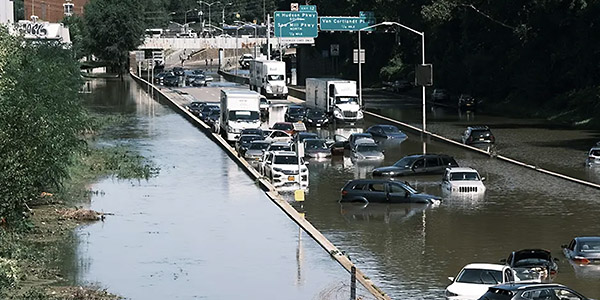
Cars on a flooded expressway in the Bronx, following rain from Hurricane Ida; photo by Spencer Platt, Getty Images
THE ATLANTIC
It keeps on raining too much too fast | Kendra Pierre-Louis SM'16
"[C]ommunity-level preparation...can help you survive a disaster, but it doesn’t solve the underlying problems with how we think of disaster preparedness," writes Pierre-Louis. So, along with infrastructure and climate-resiliency planning, she recommends more emphasis on emergency management reforms. Pierre-Louis is a climate reporter currently working with the Gimlet/Spotify podcast "How to Save a Planet," where her work focuses on how we can reduce the future impacts of climate change.
Story in the Atlantic | Kendra Pierre-Louis
MIT TECHNOLOGY REVIEW
Rising groundwater could devastate coastal communities | Kendra Pierre-Louis SM'16
"Higher sea levels will push the water table up with them, causing flooding, contamination, and all manner of unseen chaos," writes Pierre-Louis. "Roadways will be eroded from below; septic systems won’t drain; seawalls will keep the ocean out but trap the water seeping up, leading to more flooding." She offers suggestions on planning to help avoid and remedy these devastations.
Story at MIT Technology Review
BUZZFEED NEWS
Climate change is here, and deadly | Zahra Hirji SM'13
The climate crisis is here, the US is woefully unprepared, and people are already paying with their lives. "Is 2022 destined to be just as destructive and deadly as 2021? It doesn’t have to be," writes Hirji. "Straightforward steps to increase preparation and shore up infrastructure could mitigate much of the damage. But political willpower, urgent action, and key investments are often sorely lacking."
Story at BuzzFeed News | Zahra Hirji
SCIENCE WRITING 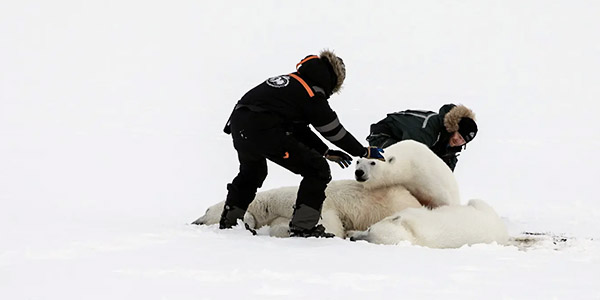
Photo by Anna Filipova, The New York Times
THE NEW YORK TIMES
How to catch a polar bear (for protective research study) | Emily Anthes SM'06
"From a helicopter, it can be hard to spot a polar bear against the frozen tundra. So when the polar bear biologist Jon Aars heads out for his annual research trips, he scans the landscape for flashes of movement or subtle variations in color — the slightly yellowish hue of the bears’ fur set off against the white snow. 'Also, very often, you see the footprints before you see the bear,' Dr. Aars said. 'And the bear is usually where the footprints stop.'”
Story at The New York Times | Emily Anthes
THE GUARDIAN
A gray wolf’s epic journey ends on a California highway | Katharine Gammon SM'07
Gammon writes that a young gray wolf "OR-93 traveled further south than any wolf had in a hundred years." The wolf "who took experts and enthusiasts on a thousand-mile journey across California died last month, ending a trek that brought hope and inspiration to many during a time of ecological collapse....Even after death, he continues to inspire."
Story at The Guardian | Katharine Gammon | @kategammon | Articles
THE NEW YORK TIMES
The ghost wolves of Galveston Island | Emily Anthes SM'06
A population of unusual-looking canids in Texas and Louisiana might help resurrect the red wolf, declared extinct in the wild in 1980. Although the canids are mostly coyote, roughly 30 percent of their genetic material is from the historic red wolf. Dr. Bridgett vonHoldt, an evolutionary biologist and canid specialist, says the hybrid coyote-wolves harbor an "ancestral genetic variation, this ghost variation, which we thought was extinct from the landscape.”
Story at The New York Times
NOVA PODCAST
The Big Bang: started from inflation, now we’re here | David Kaiser
"How does our world even exist?” Now, more than ever, scientists are finding answers within the Big Bang theory, which holds that ~13.8 billion years ago, in a fraction of a second, the universe expanded into being. NOVA talks with Kaiser, Professor of Physics and the Germeshausen Professor of the History of Science, about the forces that shaped our early universe, the tools researchers use to peer back in time, and what the universe origins can tell us about its ultimate end.
Listen to the NOVA Podcast | David Kaiser

The Veil Nebula, as seen by the Hubble Space Telescope
NATIONAL SECURITY
CENTER FOR SECURITY AND EMERGING TECHNOLOGY
AI for Judges | Hon. James E. Baker
Building on his research in the MIT SHASS Security Studies Program, Baker has co-authored a report that helps develop a framework for the judiciary to address questions involving artificial intelligence: What role should judges play in addressing the uses and issues involving AI? And relatedly, how will AI and machine learning impact judicial practice in federal and state courts?
Story | PDF: AI for Judges | James E. Baker
WBUR
World powers meet to revive Iran nuclear agreement | Jim Walsh
Walsh, a Senior Research Associate in the School's Security Studies Program and a security analyst for WBUR's Here & Now program, discusses what's at stake as world leaders meet in Vienna to revive the 2015 agreement that puts limits on Iran's nuclear development in exchange for an easing of sanctions.
Story at WBUR | Jim Walsh
THE WALL STREET JOURNAL
A failure of counterintelligence in Afghanistan | Joel Brenner
Brenner writes, "The Taliban’s penetration of the former Afghan government played a key role in the lightning collapse of the former regime...Our intelligence services were either ignorant of these facts or failed to draw obvious conclusions from them. This is what a counterintelligence failure looks like." Brenner, a Senior Research Fellow at MIT’s Center for International Studies, has served as Senior Counsel at the National Security Agency, head of US counterintelligence, and NSA’s Inspector General.
Commentary at The Wall Street Journal | Joel Brenner
FOREIGN POLICY IN FOCUS
Does Japan aspire to be a superpower? | Richard Samuels
A huge defense budget alone is not a reliable measure of power says Samuels, Ford International Professor of Political Science and Director of the Center for International Studies at MIT. “Japan is unlikely to ever be able to deter China on its own (short of nuclear breakout)," he says, "and is therefore being diligent in hugging the U.S. and cultivating relations with other countries in the region—and, you will have noticed, in Europe as well.”
Story at Foreign Policy in Focus | Richard Samuels
HEALTH AND HEALTH CARE
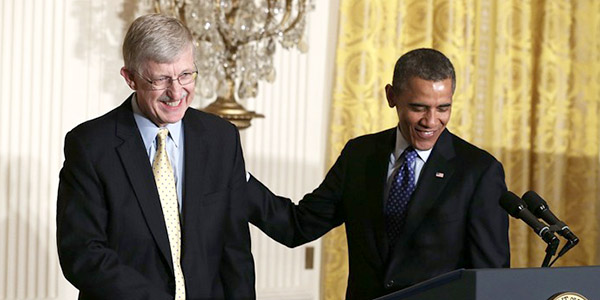
Dr. Francis Collins with former President Barack Obama as he announces the BRAIN Initiative; 2013 photo by Alex Wong
NATURE
Collins of NIH calls disinformation about science alarming | Nidhi Subbaraman SM'10
Longtime head of NIH, Francis Collins, who is now stepping down, notes that the worsening politicization of science is "a reflection of the fact that [political] polarization is much worse. If science happens to produce a result that a political perspective doesn’t like, then science has to be attacked....in many instances we seem to have lost a sense of how to tell the difference between a fact and an opinion — or some Facebook post that is, frankly, a lie. That’s truly dangerous."
Interview at Nature | Nidhi Subbaraman
NATIONAL PUBLIC RADIO
Pro-Trump counties have far higher Covid death rates | Election Lab research
NPR reports that since May 2021, people living in counties that voted heavily for Trump during the 2020 presidential election have been nearly 3X as likely to die from Covid-19 as those who live in areas that voted for now-President Joe Biden. Low vaccination rates, fueled by misinformation is the major factor.
Story at NPR | MIT Election Data & Science Lab
PROPUBLICA
They knew industrial pollution was ruining the neighborhood's air | Lisa Song SM'09
Song reports on failures in Mississippi's Department of Environmental Quality. "Raw throats, burning eyes, strong acid smells. Air monitoring that showed chemicals linked to leukemia. Barbara Weckesser and her neighbors told regulators that air pollution was making them sick. The law let them ignore her."
Story at ProPublica | Lisa Song
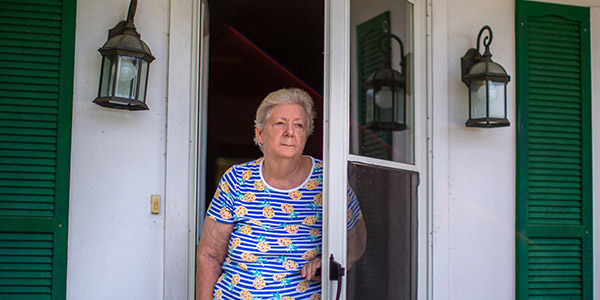
Barbara Weckesser stands in the doorway of her home in Pascagoula, Mississippi; photo by Kathleen Flynn
THE WASHINGTON POST
The ‘War on Cancer’— 50 years on | Robin Wolfe Sheffler
In a compelling essay, Scheffler, historian of the modern biological and biomedical sciences, and author of A Contagious Cause: The American Hunt for Cancer Viruses and the Rise of Molecular Medicine, discusses the costs of one group defining what "victory" against cancer means and recommends a broader, more effective vision for research. "The way that a small number of scientists and administrators narrowed what it meant to succeed against cancer stands as a cautionary tale."
Commentary at The Washington Post
NPR
50 years ago, Nixon launched the 'war on cancer' | Robin Wolfe Sheffler quoted
"'Nixon embraces the War on Cancer as a way of taking an issue away from his potential future rivals,' says Scheffler. Regardless of Nixon's motivation, the public investment was significant, $1.6 billion (almost $11 billion in today's dollars.) 'It's a substantial amount of money,' says Scheffler. 'If you consider, for example, last year, at the height of the Covid pandemic, the National Institutes of Health was given an additional $1 billion to look into Covid.'"
Story at NPR

Scientist working at Laminar Pharma in Spain; Cati Cladera,Shutterstock
STAT
Fifth Circuit Court got the science wrong | Jeffrey E. Harris
MIT economist and practicing physician Harris writes that before the US Court of Appeals for the Sixth Circuit was chosen for the task of overseeing legal challenges to OSHA's workplace vaccination mandate, "the New Orleans-based Fifth Circuit preemptively put a hold on the mandate...The Fifth Circuit Court made three fundamental scientific errors regarding the vaccination mandate, any one of which should vacate its decision."
Commentary at STAT | Jeffrey E. Harris
THE WASHINGTON POST
FDA authorizes Merck’s anti-coronavirus pill | Carolyn Johnson SM'04
Molnupiravir, developed by Merck and Ridgeback Biotherapeutics, cut the risk of hospitalization and death in high-risk patients by 30 percent when given within five days of symptom onset. In contrast, Pfizer’s antiviral drug, authorized a day earlier, reduced hospitalizations and death by 88 percent when given with five days.
Story at The Washington Post
ECONOMICS
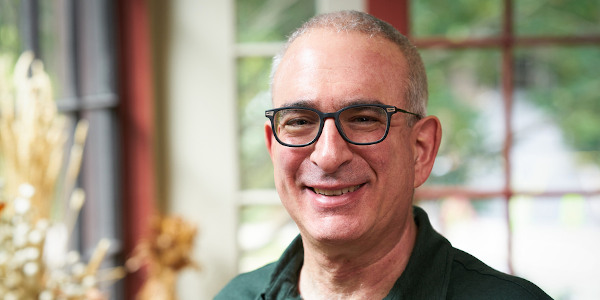
Joshua Angrist, professor of economics and Nobel laureate; photo by Lillie Paquette
EDUCATION NEXT
Joshua Angrist and the search for truth
"Josh Angrist's work has two main strands. The first develops tools to derive evidence — 'truth' — from naturally occurring phenomena in the world. The second strand applies those techniques to the real world, in many cases in the context of economics of education."
Story at Education Next | Related: A joyful revolution in econometrics | Joshua Angrist
THE NEW YORK TIMES
A feast isn’t just about food. It’s about joy. | Abhijit Banerjee
Banerjee, MIT economist and Nobel laureate, traces the historical thinking around food and workers — and food's role in fostering social joy and connectedness.
Opinion at The New York Times | Abhijit Banerjee
WGBH RADIO
Why people give donations | Jonathan Gruber
Gruber, the Ford Professor of Economics, discusses the motivations and economics of philanthropy and donations.
Conversation at WGBH | Jonathan Gruber
FORBES
Companies invest in automation to offset aging workforce | Daron Acemoglu cited
It might seem intuitive to assume that technology is adopted based primarily on the merits of the technology and its impact on things like productivity. That isn't, however, what new research from MIT shows. Instead, it argues that we tend to invest more in robotics and other automation-based technologies when our populations become older as employers strive to plug gaps in an aging workforce.
Story at Forbes | Daron Acemoglu
BLOOMBERG
Washington hasn’t learned the real lesson of the China shock | David Autor cited
Autor, Dorn, and Hanson documented how, while the China shock actually peaked in 2010, it was still being felt as recently as 2019. The economists endorse the view that for the U.S. economy as a whole, China’s rise has been beneficial. The problem is the job losses were concentrated intensely in places such as North Carolina’s furniture belt and factory towns in the Midwest — and the policies meant to help those places recover were too timid.
Story at Bloomberg | David Autor
WGBH RADIO
The US lags in maternal health and infant mortality | Jonathan Gruber
Gruber explained why the United States lags behind other developed nations in maternal health and infant mortality and what Build Back Better could do to improve things.
Conversation at WGBH
AWARDS AND HONORS
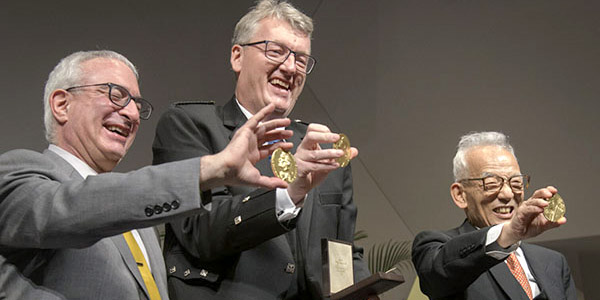
L to R: Economist Joshua Angrist, chemist David MacMillan, and physicist Syukuro Manabe at the Nobel Prize ceremony
ECONOMICS
Joshua Angrist receives the Nobel Medal in Washington DC ceremony
MIT Professor Angrist won a share of the 2021 Sveriges Riksbank Prize in Economic Sciences in Memory of Alfred Nobel along with David Card and Guido Imbens for his work building the foundations of “natural experiments” in economic research. On Monday, December 6, he posed (at left) with 2021 chemistry laureate David MacMillan (center) and physics laureate Syukuro Manabe at a ceremony in Washington.
Coverage by the National Academies of Sciences, Engineering, and Medicine | Nobel photo gallery
ANTHROPOLOGY
Amy Moran-Thomas wins Victor Turner Prize
Associate Professor Moran-Thomas receives the 2021 prize from the Society for Humanistic Anthropology for her book Traveling with Sugar: Chronicles of a Global Epidemic. Accepting the Turner Prize in a video recording, Moran-Thomas reads a short excerpt from her book.
Story + Video | About the book | Story: Planetary Change and Human Health
HISTORY; WRITING; THEATER ARTS; SCIENCE, TECHNOLOGY, AND SOCIETY
Six faculty receive MIT SHASS Research Fund awards for 2022
The SHASS Research Fund supports research in the Institute's humanities, arts, and social science fields that shows promise of making an important contribution to the proposed area of activity. Congratulations, all!
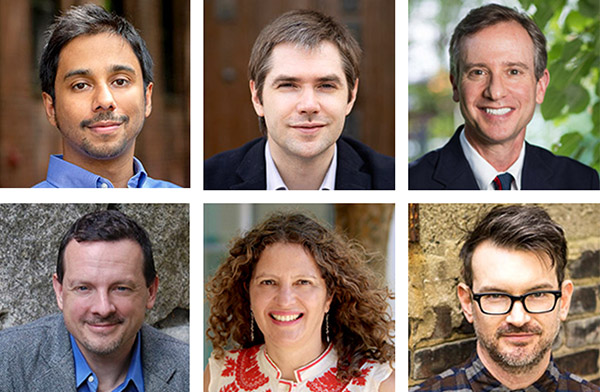
Upper Row: Dwai Banerjee, Associate Professor, Program in Science, Technology, and Society; Tristan Brown, Assistant Professor, History; Eric Goldberg, Professor of History. Lower Row: Nick Montfort, Professor, Comparative Media Studies/Writing; Tanalís Padilla, Professor of History; Ken Urban, Senior Lecturer, Music and Theater Arts
LITERATURE
Joshua Bennett receives the MLA's Scarborough Prize
Bennett, a former diversity pre-doctoral fellow in MIT Literature, received the prize for his book Being Property Once Myself: Blackness and the End of Man (Harvard University Press). The Committee's citation reads, in part: "Brilliant in its approach and gorgeous in its prose, Joshua Bennett’s Being Property Once Myself employs conceptual frames from ecological criticism and animal studies to recast and reinterpret the African American literary imagination."
Press Release | Joshua Bennett | About the book | Review, LA Review of Books
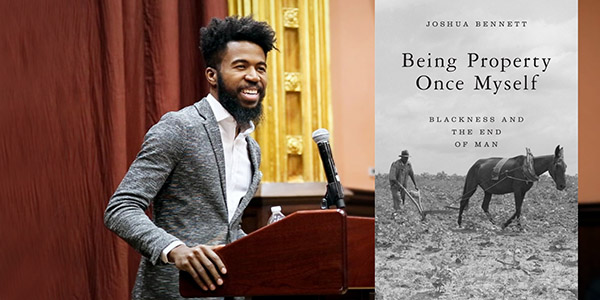
Professor Joshua Bennett at the University of Pittsburgh; Book Cover
LINGUISTICS
Shigeru Miyagawa awarded the São Paulo Excellence Chair
The award, given by the São Paulo Research Foundation, recognizes Professor Miyagawa's his work in language and evolution and will support research at the University of São Paulo in archeology, biology, linguistics, and animal communication studies. Miyagawa will be appointed as a visiting faculty member in USP’s Biosciences Institute.
Miyagawa website | São Paulo Research Foundation
SCIENCE, TECHNOLOGY, AND SOCIETY
Jennifer Light receives Outstanding Scholarly Contribution Awards from ASA
Light, the Bern Dibner Professor of the History of Science and Technology, and a Professor of Urban Studies and Planning, received the honor from the American Sociological Association's Section on Children and Youth for her paper, "Students as Economic Actors, Past and Present," published in the Harvard Educational Review, 89(1): 85–108.
Award citation | Paper | Light webpage | Story at MIT News
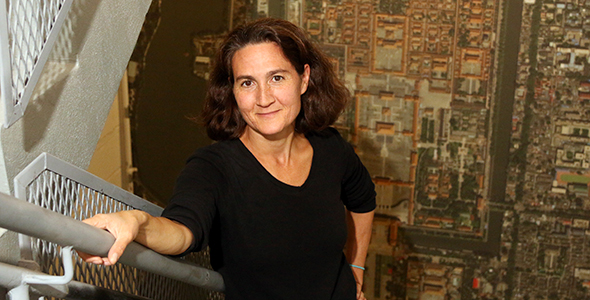
Jennifer Light, Bern Dibner Professor of the History of Science & Technology; photo by Allegra Boverman
PUBLICATIONS DIRECTORY
A Convenient, One-Page Portal
Here you will find all the online channels, newsletters, and publications produced by the School's 20+ departments, sections, programs, and centers. Look for current research, news, and commentaries from each of the MIT SHASS fields.
Visit the Publications Directory
The Media + Awards Digest is a section
of Said and Done, the School's online digest.
EXPLORE
Follow MIT Now
Updates on the return to campus
Subscribe to Said and Done
10 issues a year
Making a Better World | Research
Browse
Making a Just Society
Explore the Resources
Solving Climate
Browse the Commentaries | MIT Climate Portal
Ethics, Computing, and AI
Full Series
Computing and AI | Humanistic Perspectives
Full Series
Perspectives for the Pandemic
Explore the Series
SHASS on MIT News
Research and Features
MIT Campaign for a Better World
Story | Join Us
Published by MIT SHASS Communications
Office of the Dean, MIT School of Humanities, Arts, and Social Sciences
Editor and Designer: Emily Hiestand
Publication Associate: Alison Lanier
Media Relations Manager: Stephen Oakes
Published 6 January 2022




